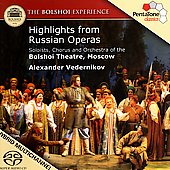|
You are reading the older HTML site
Positive Feedback
ISSUE
26
The Bolshoi Experience - Highlights from
Russian Operas CD, PentaTone SACD
The Bolshoi Opera ...started in 1776 by Prince Pyotr Urusov and his English partner Michael Maddox set up a small theater with the permission of Empress Catherine II ...history was being made at the same time as a few gentlemen were fomenting a revolution way up the east coast of North America. Obviously, good things developed from both efforts: a world class opera house and a great country. The Bolshoi is plenty busy year round with hundreds of productions of opera and ballet. I once had an acquaintance who tried for several years to get tickets to performances ...ANY performance. My poor acquaintance finally decided that it was not his lot in life to ever attend, as he never did get a chance before he died some years back. Poor fellow indeed, if the material on this new PentaTone SACD is any indication of what he missed. This recent release will be quite a treat for opera fans. While the early years in the Bolshoi's history were heavily influenced by non-Russian influences (mainly Italian) it was in the 19th century that the emerging feeling of Russian nationalism created a surge of operas by Russian composers like Tchaikovsky, Mikhail Glinka and Alexander Borodin. While many of the Russian operas are now remembered by a few select pieces (Polovtsian Dances from Borodin's Prince Igor comes to mind) other composer's operas are still mainstays in opera houses around the world (Tchaikovsky's Queen of Spades and Eugene Oneigin and Glinka's Ruslan and Lyudmila). The recording here features some excellent music by Tchaikovsky (Pique Dame, Iolanthe, Mazeppa), Glinka (A Life for the Tsar), Alexander Dargomizhsky (Rusalka, an opera previously unknown to me), Sergei Rachmaninoff (Aleko, another surprise) and finally, Borodin (Prince Igor). Despite my ignorance of the opera Rusalka and Aleko, the music on all selections ranges from interesting to quite exciting! Undoubtedly, Borodin's Polovtsian Dances will be the most familiar to many people. While the Borodin here is one of the best I have heard on record, the remaining selections are all example of great composers. Even the Rachmaninoff (who is best known for his piano concertos and vocal writing) did an admirable job. The performers are all Russian (as one would expect). It may seem illogical to mention this, but I have heard way too many singers attempt to sing in a foreign language and sound simply stilted and studied ...pretty poor in fact. To be fair, I remember my days singing in the Ohio State Men's Glee Club when we had to learn a song in Welsh. Damn, that was one tough song!! Other dreadful memories abound, like listening to horribly forced German diction during the speaking parts of Mozart's Die Zauberflöte. Needless to say, there are NO issues with the daunting Russian language on this recording!! The soloists are a mixture of primarily tenors, sopranos, and especially basses. I do not know what is in the Russian physiological makeup, but Russia has produced some of the best bassos on the planet ...was it perhaps some imperial decree from a music loving Czar that decreed that Russia would have the best, most powerful and lowest basses on the planet? Or maybe it was too much vodka and green cigars during those long winters? Heck, I bet that if there was a Russian opera or choral piece ever written that did not feature some basso stupendo, then every tree on earth would probably wither. I have to offer a great deal of praise for the choruses which are all very fine; big voices and a great deal of enthusiasm. Like my issues with poor diction, I have heard plenty of too small choirs in both opera productions as well as big orchestral/choral works (Mahler, etc). Perhaps this is what pleases me most about this SACD ...hearing extremely well balanced choruses!! All of the soloists are excellent, with the lone exception of one of the tenors, Mikhail Gubsky. While his singing is just okay, he is simply not on par with the other tenor we hear in Tchaikovsky's Iolanthe. This however is a minor nit. PentaTone is one of a number of labels that I have come to be very fond of. I have the ultimate respect for the Polyhymnia team (the same team responsible for the fabulous Caro Mitis SACD recordings). The sound is expansive, well detailed, very transparent and gives the listener an excellent feel for the house. I have no trouble "seeing" into the forces and there is plenty of detail captured. As usual, the sound is simply excellent! Sadly, there are not many recordings available of the Bolshoi. If you think you would like to hear the Bolshoi but never expect to get to Russia, then this SACD is for you. Same goes for opera fans that like Russian opera (and want to hear it done correctly) then this SACD is also for you. Do I like this SACD? You bet, in case you have not already guessed!! Highly recommended! PentaTone www.pentatonemusic.com
|

